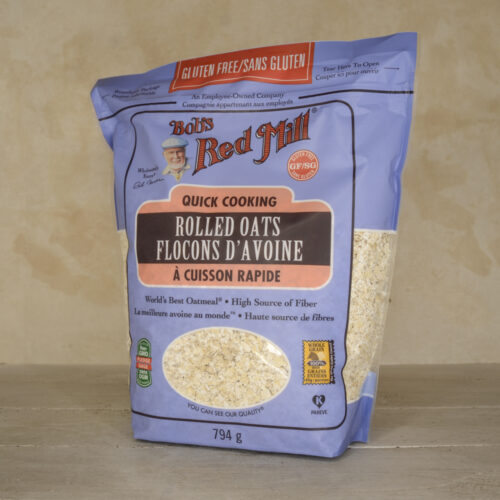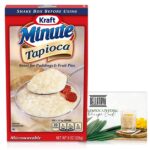Oats are easily one of the healthiest and most popular breakfast cereals in the world. They do not get as much love as they deserve because they may not exactly have the most impressive taste. Aside from the application as a breakfast cereal oats are also very popular in cooking and baking. Quick-cooking oats have become very popular as the world looks to do everything quicker. You will see many recipes recommend quick-cooking oats. Now if you don’t happen to have them on hand you have probably searched for substitutes. Before we get into the viable substitutes we should have a look at oats, quick-cooking oats and the qualities they are favoured for.
Contents
Quick Cooking Oats
Oats are the seeds of a grass plant known in scientific terms as Avena Sativa. The plant also goes by the common name oat though the seeds are referred to in plural as oats. The grain became popular as a livestock feed and also for human consumption. Oats have further uses in cooking, baking, as oatmeal flour, in other cereals such as muesli and granola and in producing oatmeal milk. Oats have a stellar nutritional profile that includes being 11% fibre, 17% protein, containing 6 B vitamins (Thiamine B1, Riboflavin B2, Niacin B3, Pantothenic acid B5, Pyridoxine B6 and Folate B9) and significant levels of 8 essential minerals (Calcium, Iron, Magnesium, Manganese, Phosphorus, Potassium, Sodium and Zinc). To arrive at quick-cooking oats, whole groats (unprocessed oat grains) are rolled and then further processed. They are partially cooked through steaming and further rolled to make them thinner than regular rolled oats and this helps them cook much quicker. The best substitute for quick-cooking oats will depend on the reason you want to substitute them. Let’s look at our list of substitutes.
Rolled Oats
Quick-cooking oats are made from rolled oats so it makes sense to look at rolled oats as our first substitute for quick-cooking oats. Rolled oats are lightly processed form of oats which you may know better as regular oats. The processing of rolling starts with groats, these are unprocessed oat grains which are first dehusked then steamed. Once steamed the oats are rolled into the flat flakes we are accustomed to and then lightly toasted to expel the moisture from the steaming. These come in two varieties which are thick rolled oats, otherwise known as traditional or old-fashioned oats which as the name suggests have thicker flakes. You can also get them in thinly rolled oats which are the more popular variety and have much flatter flakes. Quick-cooking oats go through this process again. If you are substituting in oatmeal you will find the main differences between quick-cooking oats and rolled oats come in cooking time and texture. Quick-cooking oats of course cook quicker because of their par cooking process while rolled oats will take longer. Rolled oats will also come out drier than quick-cooking oats when cooked. To bridge this gap the best advice is to blend the rolled oats before cooking them. This breaks down the oats into smaller pieces and helps them cook quicker. The idea is to pulse for 15 to 20 seconds in 5-second bursts. The same principle applies if you are baking or cooking with them and want to stick to the recipe times as much as possible.
Steel Cut Oats
Another version of oatmeal that can work as a quick-cooking oats substitute is steel cuts oats. Depending on which part of the world you’re in you may find these being sold as pinhead oats, coarse oatmeal or Irish oats. These are whole grain oats that are not processed but instead, the grain is cut using a machine, hence the steel cut oats name. The grains are cut to shorten them and this is where the pinhead name comes from. Due to the lack of processing steel-cut oats will firstly take longer to cook than other types of oats. It’s not all bad news for steel-cut oats however, they have a nuttier flavour than rolled and quick-cooking oats. They also have a chewier texture as they are not steamed to soften them. If you want to use them as a substitute in oatmeal porridge be aware of the texture and the longer cooking time. Blending them will make the oat pieces smaller but this will not make them cook quicker. To achieve this you can soak them before cooking. Anything between an hour and 12 hours before using them will help. Steel-cut oats can be used as a substitute when baking. However, you should be aware that unless soaked they will have far less moisture than quick-cooking oats and this will affect your recipe. Steel-cut oats are not a preferred substitute for quick-cooking oats and should only be used when you have no other option.
Oat flour
Another quick-cooking oats substitute you can try is oatmeal flour. This substitute only works in limited circumstances as you will be dealing with a fine flour made from oatmeal. The flour is made from stone grinding whole groats either by stone or hammer mill multiple times while sifting out the husks to produce a fine flour. If you are baking you can use this as a substitute for quick-cooking oats from a nutritional perspective. Oat flour is fine and therefore it is not a volume match for quick-cooking oats. Oatmeal flour is denser than quick-cooking oats. Oat flour will also work if you want to substitute it for quick-cooking oats in smoothies and shakes. As a thickener in recipes, it works very well, even better than quick-cooking oats.
You have three good options for substituting quick-cooking oats. Rolled oats are your best bet and you can blend them to make them cook quicker and closely match the texture of quick-cooking oats. Steel-cut oats can work but you need to be aware of the massive texture difference as they are rougher. Oatmeal flour sits at the other end of the spectrum and is a great substitute for quick-cooking oats in smoothies but the finer texture will prove hard to work with many other recipes.







